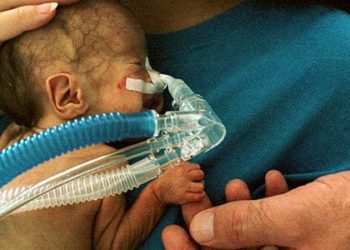Shortage of evidence assessing teratogenic drugs
Image: CC/Otis
1. Studies evaluating teratogenicity were highly variable in methodological rigor and often limited in power.
2. The drugs for which teratogenic risks have been assessed did not correlate well with those drugs most used by pregnant women.
Study Rundown: This study found that there is limited evidence evaluating the risk of birth defects associated with drugs thought to be teratogenic. Prior work has focused on assessing the risk of defects associated with specific drugs or classes of drugs. Given that many women take potentially teratogenic medications during pregnancy, the present work provides an overview of the evidence for specific birth defects associated with these drugs.
This literature review is limited by inclusion of birth defects only in live infants; this may underestimate the true impact of teratogens, which might contribute to or cause anomalies in stillborn and aborted fetuses. Future studies might evaluate the latter and include a meta-analysis to pool existing data for more highly powered results.
Click to read the study in Human Reproduction
Relevant Reading: Evolving knowledge of the teratogenicity of medications in human pregnancy
In-Depth [literature review]: This study reviewed findings from 250 articles to assess the level of evidence existing for the risk of birth defects associated with drugs that have teratogenic mechanisms. The presence or absence of specific defects in live infants was evaluated for 287 drugs of interest.
Prospective cohort studies, case-control studies, and randomized controlled trials were identified for fewer than half of the medications commonly taken in pregnancy included in this review. Only 54.7-56.5% of cohort studies included an unexposed reference group, and follow-up and participation rates were often not reported. Of the 15 drugs in which specific defects were assessed in ≥1000 infants, 13 were associated with ≥1 birth defect. The four most commonly studied drugs were all antiepileptics.
By Denise Pong, MPH and Leah Hawkins, MD, MPH
More from this author: HPV infection associated with preeclampsia, Conservative treatment of recurrent ovarian tumors may preserve fertility, Recommendations for intrapartum management of TOLAC, Childbearing decreased after C-sections, Episiotomies and epidurals reduce odds of obstetric anal sphincter injury
© 2013 2minutemedicine.com. All rights reserved. No works may be reproduced without expressed written consent from 2minutemedicine.com. Disclaimer: We present factual information directly from peer reviewed medical journals. No post should be construed as medical advice and is not intended as such by the authors, editors, staff or by 2minutemedicine.com. PLEASE SEE A HEALTHCARE PROVIDER IN YOUR AREA IF YOU SEEK MEDICAL ADVICE OF ANY SORT.





